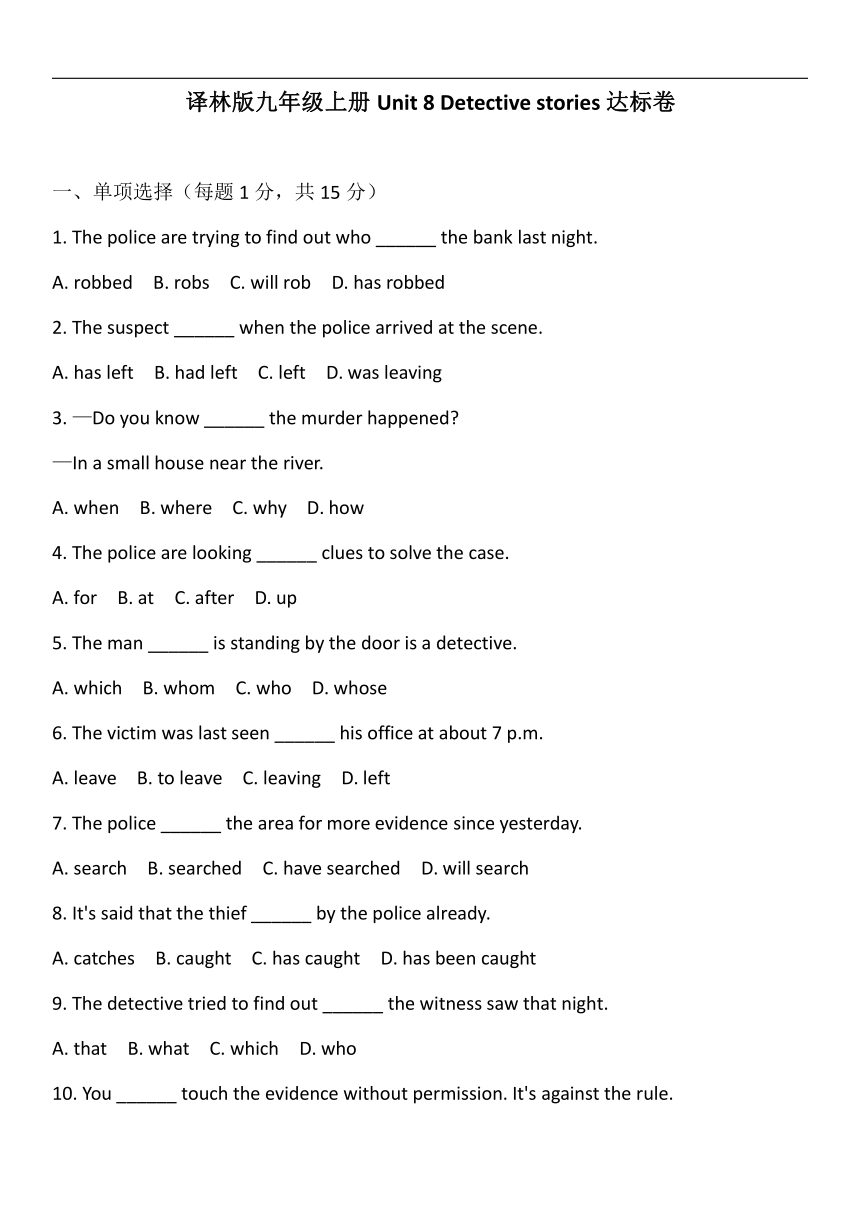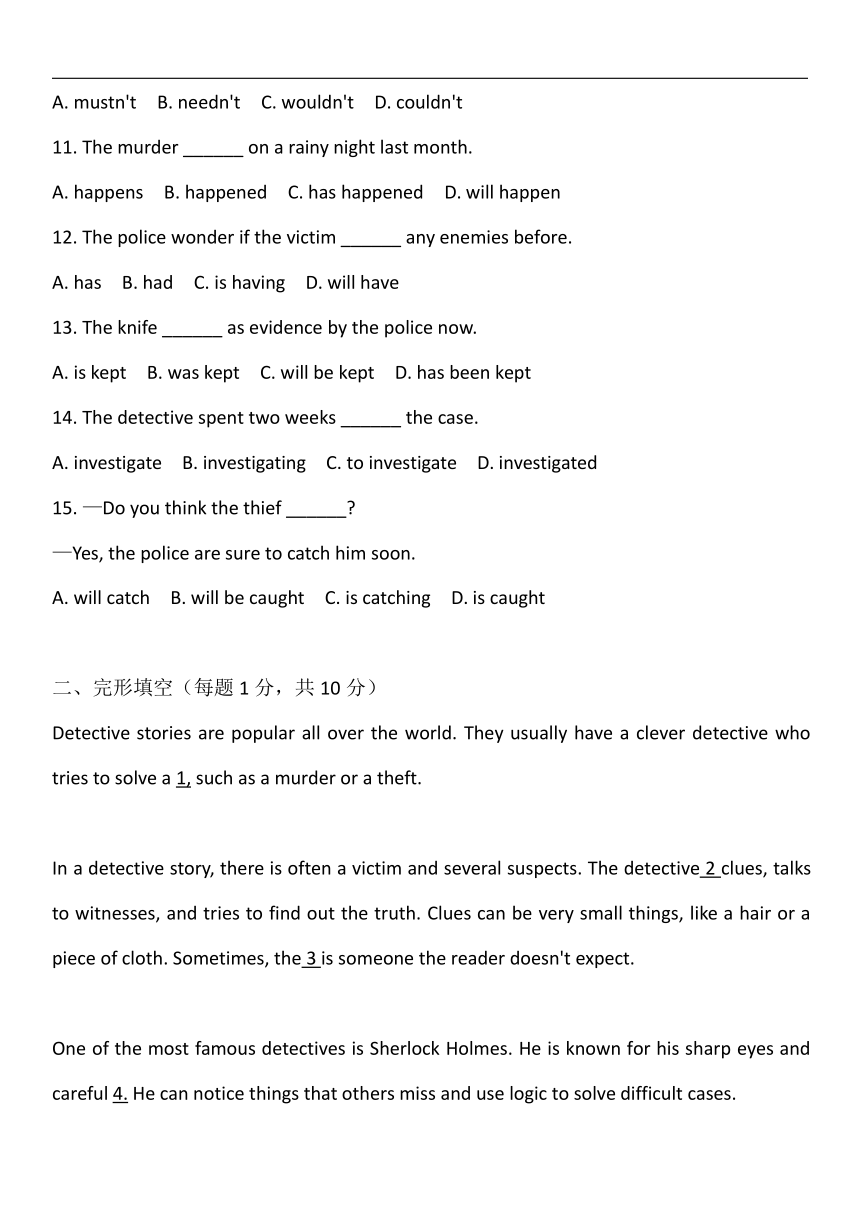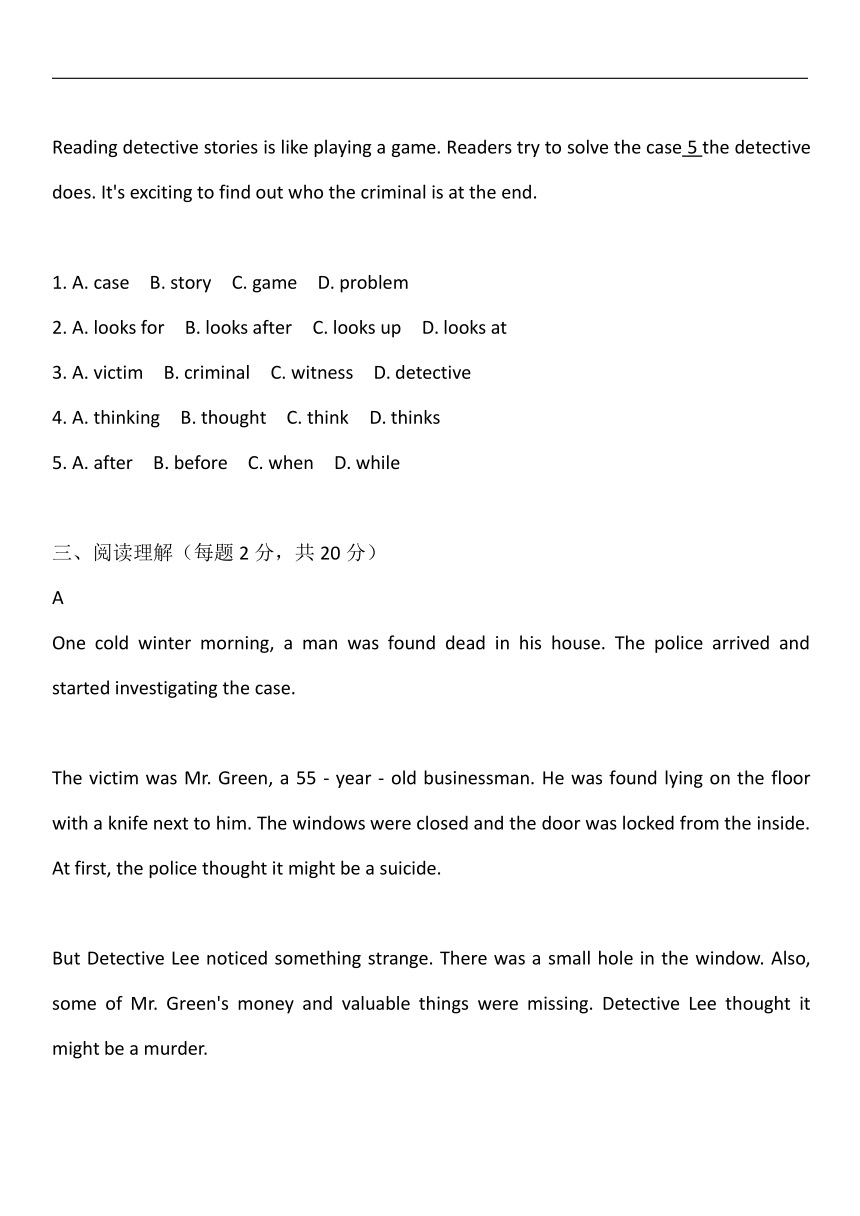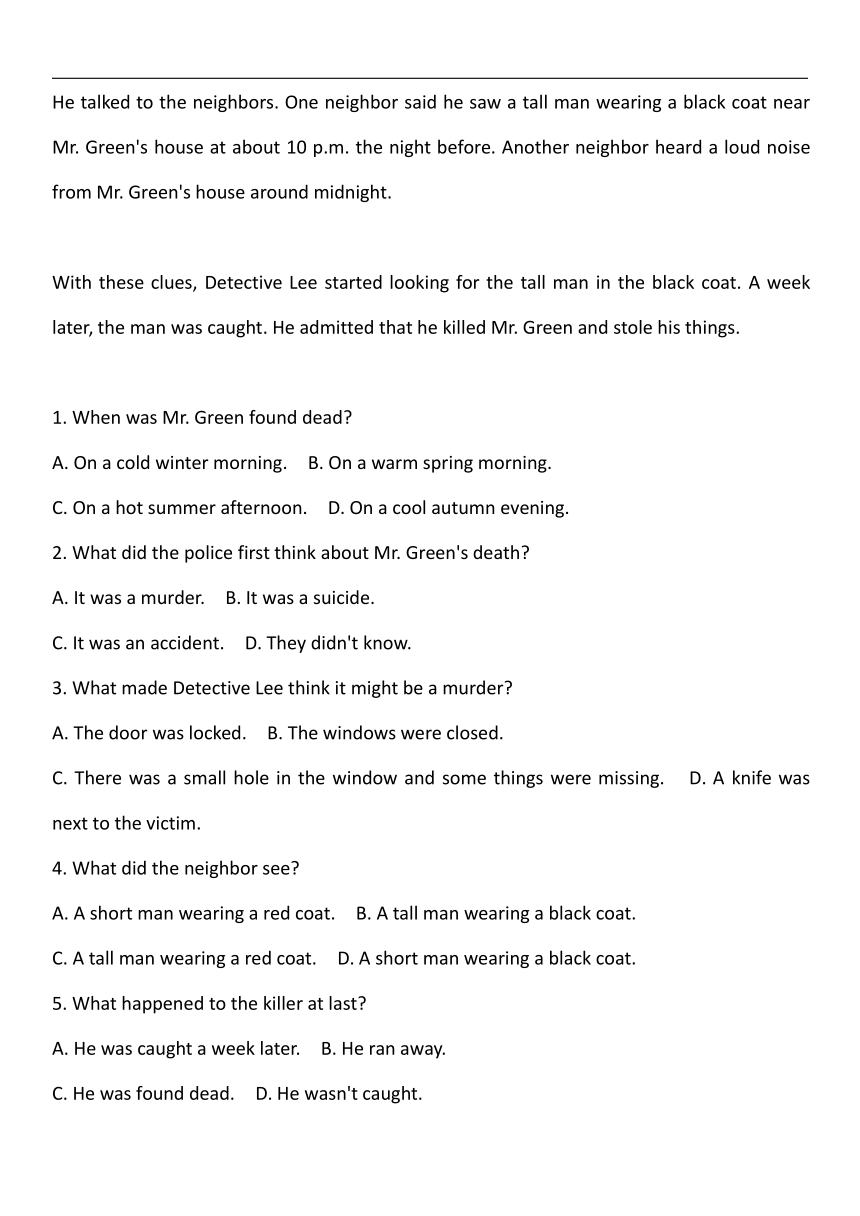Unit 8 Detective stories 达标卷(含答案,无听力音频及原文)-2025-2026学年译林版英语九年级上册
文档属性
| 名称 | Unit 8 Detective stories 达标卷(含答案,无听力音频及原文)-2025-2026学年译林版英语九年级上册 |  | |
| 格式 | docx | ||
| 文件大小 | 21.1KB | ||
| 资源类型 | 教案 | ||
| 版本资源 | 牛津译林版 | ||
| 科目 | 英语 | ||
| 更新时间 | 2025-07-16 10:59:25 | ||
图片预览




文档简介
译林版九年级上册Unit 8 Detective stories达标卷
一、单项选择(每题1分,共15分)
1. The police are trying to find out who ______ the bank last night.
A. robbed B. robs C. will rob D. has robbed
2. The suspect ______ when the police arrived at the scene.
A. has left B. had left C. left D. was leaving
3. —Do you know ______ the murder happened
—In a small house near the river.
A. when B. where C. why D. how
4. The police are looking ______ clues to solve the case.
A. for B. at C. after D. up
5. The man ______ is standing by the door is a detective.
A. which B. whom C. who D. whose
6. The victim was last seen ______ his office at about 7 p.m.
A. leave B. to leave C. leaving D. left
7. The police ______ the area for more evidence since yesterday.
A. search B. searched C. have searched D. will search
8. It's said that the thief ______ by the police already.
A. catches B. caught C. has caught D. has been caught
9. The detective tried to find out ______ the witness saw that night.
A. that B. what C. which D. who
10. You ______ touch the evidence without permission. It's against the rule.
A. mustn't B. needn't C. wouldn't D. couldn't
11. The murder ______ on a rainy night last month.
A. happens B. happened C. has happened D. will happen
12. The police wonder if the victim ______ any enemies before.
A. has B. had C. is having D. will have
13. The knife ______ as evidence by the police now.
A. is kept B. was kept C. will be kept D. has been kept
14. The detective spent two weeks ______ the case.
A. investigate B. investigating C. to investigate D. investigated
15. —Do you think the thief ______
—Yes, the police are sure to catch him soon.
A. will catch B. will be caught C. is catching D. is caught
二、完形填空(每题1分,共10分)
Detective stories are popular all over the world. They usually have a clever detective who tries to solve a 1, such as a murder or a theft.
In a detective story, there is often a victim and several suspects. The detective 2 clues, talks to witnesses, and tries to find out the truth. Clues can be very small things, like a hair or a piece of cloth. Sometimes, the 3 is someone the reader doesn't expect.
One of the most famous detectives is Sherlock Holmes. He is known for his sharp eyes and careful 4. He can notice things that others miss and use logic to solve difficult cases.
Reading detective stories is like playing a game. Readers try to solve the case 5 the detective does. It's exciting to find out who the criminal is at the end.
1. A. case B. story C. game D. problem
2. A. looks for B. looks after C. looks up D. looks at
3. A. victim B. criminal C. witness D. detective
4. A. thinking B. thought C. think D. thinks
5. A. after B. before C. when D. while
三、阅读理解(每题2分,共20分)
A
One cold winter morning, a man was found dead in his house. The police arrived and started investigating the case.
The victim was Mr. Green, a 55 - year - old businessman. He was found lying on the floor with a knife next to him. The windows were closed and the door was locked from the inside. At first, the police thought it might be a suicide.
But Detective Lee noticed something strange. There was a small hole in the window. Also, some of Mr. Green's money and valuable things were missing. Detective Lee thought it might be a murder.
He talked to the neighbors. One neighbor said he saw a tall man wearing a black coat near Mr. Green's house at about 10 p.m. the night before. Another neighbor heard a loud noise from Mr. Green's house around midnight.
With these clues, Detective Lee started looking for the tall man in the black coat. A week later, the man was caught. He admitted that he killed Mr. Green and stole his things.
1. When was Mr. Green found dead
A. On a cold winter morning. B. On a warm spring morning.
C. On a hot summer afternoon. D. On a cool autumn evening.
2. What did the police first think about Mr. Green's death
A. It was a murder. B. It was a suicide.
C. It was an accident. D. They didn't know.
3. What made Detective Lee think it might be a murder
A. The door was locked. B. The windows were closed.
C. There was a small hole in the window and some things were missing. D. A knife was next to the victim.
4. What did the neighbor see
A. A short man wearing a red coat. B. A tall man wearing a black coat.
C. A tall man wearing a red coat. D. A short man wearing a black coat.
5. What happened to the killer at last
A. He was caught a week later. B. He ran away.
C. He was found dead. D. He wasn't caught.
B
Detective stories have been popular for a long time. They not only tell exciting stories but also teach us about logic and observation.
In many detective stories, the detective uses clues to find the criminal. Clues can be anything from a footprint to a piece of paper. The detective puts these clues together and uses logic to find out the truth.
Reading detective stories can help us improve our observation skills. We learn to notice small details that others might miss. It also teaches us to think logically and connect different pieces of information.
Some detective stories also show us how the police work. We learn about the steps they take to solve a case, such as interviewing witnesses, collecting evidence, and searching for clues.
Whether it's a book or a film, detective stories are always interesting. They keep us guessing until the end.
1. What do detective stories tell us
A. Only exciting stories. B. Only about logic and observation.
C. Both exciting stories and knowledge about logic and observation. D. Nothing useful.
2. What do detectives use to find the criminal
A. Clues. B. Money. C. Friends. D. Computers.
3. What can reading detective stories help us do
A. Improve our observation skills and learn to think logically. B. Only improve our writing skills.
C. Only make us laugh. D. Make us sleep better.
4. What do we learn about from some detective stories
A. How to be a criminal. B. How the police work.
C. How to steal things. D. How to lie.
5. Why are detective stories interesting
A. Because they are boring. B. Because they keep us guessing until the end.
C. Because they are too easy. D. Because they have no endings.
四、词汇运用(每题1分,共15分)
A) 根据句意及首字母提示填空
1. The police are trying to find the c______ who stole the money.
2. The detective found some important c______ at the scene of the crime.
3. The v______ was a young woman who worked in a bank.
4. The witness gave the police a detailed d______ of the suspect.
5. The police are i______ the case carefully to find out the truth.
用所给单词的适当形式填空
6. The thief ______ (catch) by the police yesterday.
7. The detective spent three days ______ (look) for evidence.
8. The victim ______ (see) entering the building at 8 p.m. last night.
9. The police ______ (not find) the murder weapon yet.
10. It's important for us ______ (protect) the crime scene.
C) 选词并用其适当形式填空
solve, admit, notice, lie, steal
11. The detective tried his best to ______ the case.
12. The suspect finally ______ that he had committed the crime.
13. She ______ a small scar on the man's face.
14. The thief ______ a lot of money from the bank last week.
15. The victim ______ on the floor when the police arrived.
五、句型转换(每题2分,共10分)
1. The police caught the thief yesterday.(改为被动语态)
The thief ______ ______ by the police yesterday.
2. The murder happened in a small village.(对划线部分提问)
______ ______ the murder ______
3. He noticed something strange.(改为否定句)
He ______ ______ ______ strange.
4. The detective said, "I will solve the case soon."(改为间接引语)
The detective said that ______ ______ solve the case soon.
5. It's possible that he is the criminal.(改为同义句)
He ______ ______ the criminal.
六、书面表达(20分)
请以 “A Detective Story I Know” 为题,写一篇短文,讲述你知道的一个侦探故事。内容包括案件的发生、侦探的调查过程以及案件的结果等。字数不少于80字。
____________________________________________________________________________________________________________________________________________________________________________________________________________________________________________________________________________________________________________________________________________________________________________________________________________________________________________________________________________________________________________________________________________________________________________________________________________________________________________________________________________________________________________________________________________________________________________________________________________________________________________________________________________________________________________________________________
答案
一、1-5 ABBAC 6-10 CCDBA 11-15 BBA BB
二、1-5 AABAB
三、A:1-5 ABCBA B:1-5 CAABB
四、A) 1. criminal 2. clues 3. victim 4. description 5. investigating
B) 6. was caught 7. looking 8. was seen 9. haven't found 10. to protect
C) 11. solve 12. admitted 13. noticed 14. stole 15. was lying
五、1. was caught 2. Where did; happen 3. didn't notice anything 4. he would 5. may be
一、单项选择(每题1分,共15分)
1. The police are trying to find out who ______ the bank last night.
A. robbed B. robs C. will rob D. has robbed
2. The suspect ______ when the police arrived at the scene.
A. has left B. had left C. left D. was leaving
3. —Do you know ______ the murder happened
—In a small house near the river.
A. when B. where C. why D. how
4. The police are looking ______ clues to solve the case.
A. for B. at C. after D. up
5. The man ______ is standing by the door is a detective.
A. which B. whom C. who D. whose
6. The victim was last seen ______ his office at about 7 p.m.
A. leave B. to leave C. leaving D. left
7. The police ______ the area for more evidence since yesterday.
A. search B. searched C. have searched D. will search
8. It's said that the thief ______ by the police already.
A. catches B. caught C. has caught D. has been caught
9. The detective tried to find out ______ the witness saw that night.
A. that B. what C. which D. who
10. You ______ touch the evidence without permission. It's against the rule.
A. mustn't B. needn't C. wouldn't D. couldn't
11. The murder ______ on a rainy night last month.
A. happens B. happened C. has happened D. will happen
12. The police wonder if the victim ______ any enemies before.
A. has B. had C. is having D. will have
13. The knife ______ as evidence by the police now.
A. is kept B. was kept C. will be kept D. has been kept
14. The detective spent two weeks ______ the case.
A. investigate B. investigating C. to investigate D. investigated
15. —Do you think the thief ______
—Yes, the police are sure to catch him soon.
A. will catch B. will be caught C. is catching D. is caught
二、完形填空(每题1分,共10分)
Detective stories are popular all over the world. They usually have a clever detective who tries to solve a 1, such as a murder or a theft.
In a detective story, there is often a victim and several suspects. The detective 2 clues, talks to witnesses, and tries to find out the truth. Clues can be very small things, like a hair or a piece of cloth. Sometimes, the 3 is someone the reader doesn't expect.
One of the most famous detectives is Sherlock Holmes. He is known for his sharp eyes and careful 4. He can notice things that others miss and use logic to solve difficult cases.
Reading detective stories is like playing a game. Readers try to solve the case 5 the detective does. It's exciting to find out who the criminal is at the end.
1. A. case B. story C. game D. problem
2. A. looks for B. looks after C. looks up D. looks at
3. A. victim B. criminal C. witness D. detective
4. A. thinking B. thought C. think D. thinks
5. A. after B. before C. when D. while
三、阅读理解(每题2分,共20分)
A
One cold winter morning, a man was found dead in his house. The police arrived and started investigating the case.
The victim was Mr. Green, a 55 - year - old businessman. He was found lying on the floor with a knife next to him. The windows were closed and the door was locked from the inside. At first, the police thought it might be a suicide.
But Detective Lee noticed something strange. There was a small hole in the window. Also, some of Mr. Green's money and valuable things were missing. Detective Lee thought it might be a murder.
He talked to the neighbors. One neighbor said he saw a tall man wearing a black coat near Mr. Green's house at about 10 p.m. the night before. Another neighbor heard a loud noise from Mr. Green's house around midnight.
With these clues, Detective Lee started looking for the tall man in the black coat. A week later, the man was caught. He admitted that he killed Mr. Green and stole his things.
1. When was Mr. Green found dead
A. On a cold winter morning. B. On a warm spring morning.
C. On a hot summer afternoon. D. On a cool autumn evening.
2. What did the police first think about Mr. Green's death
A. It was a murder. B. It was a suicide.
C. It was an accident. D. They didn't know.
3. What made Detective Lee think it might be a murder
A. The door was locked. B. The windows were closed.
C. There was a small hole in the window and some things were missing. D. A knife was next to the victim.
4. What did the neighbor see
A. A short man wearing a red coat. B. A tall man wearing a black coat.
C. A tall man wearing a red coat. D. A short man wearing a black coat.
5. What happened to the killer at last
A. He was caught a week later. B. He ran away.
C. He was found dead. D. He wasn't caught.
B
Detective stories have been popular for a long time. They not only tell exciting stories but also teach us about logic and observation.
In many detective stories, the detective uses clues to find the criminal. Clues can be anything from a footprint to a piece of paper. The detective puts these clues together and uses logic to find out the truth.
Reading detective stories can help us improve our observation skills. We learn to notice small details that others might miss. It also teaches us to think logically and connect different pieces of information.
Some detective stories also show us how the police work. We learn about the steps they take to solve a case, such as interviewing witnesses, collecting evidence, and searching for clues.
Whether it's a book or a film, detective stories are always interesting. They keep us guessing until the end.
1. What do detective stories tell us
A. Only exciting stories. B. Only about logic and observation.
C. Both exciting stories and knowledge about logic and observation. D. Nothing useful.
2. What do detectives use to find the criminal
A. Clues. B. Money. C. Friends. D. Computers.
3. What can reading detective stories help us do
A. Improve our observation skills and learn to think logically. B. Only improve our writing skills.
C. Only make us laugh. D. Make us sleep better.
4. What do we learn about from some detective stories
A. How to be a criminal. B. How the police work.
C. How to steal things. D. How to lie.
5. Why are detective stories interesting
A. Because they are boring. B. Because they keep us guessing until the end.
C. Because they are too easy. D. Because they have no endings.
四、词汇运用(每题1分,共15分)
A) 根据句意及首字母提示填空
1. The police are trying to find the c______ who stole the money.
2. The detective found some important c______ at the scene of the crime.
3. The v______ was a young woman who worked in a bank.
4. The witness gave the police a detailed d______ of the suspect.
5. The police are i______ the case carefully to find out the truth.
用所给单词的适当形式填空
6. The thief ______ (catch) by the police yesterday.
7. The detective spent three days ______ (look) for evidence.
8. The victim ______ (see) entering the building at 8 p.m. last night.
9. The police ______ (not find) the murder weapon yet.
10. It's important for us ______ (protect) the crime scene.
C) 选词并用其适当形式填空
solve, admit, notice, lie, steal
11. The detective tried his best to ______ the case.
12. The suspect finally ______ that he had committed the crime.
13. She ______ a small scar on the man's face.
14. The thief ______ a lot of money from the bank last week.
15. The victim ______ on the floor when the police arrived.
五、句型转换(每题2分,共10分)
1. The police caught the thief yesterday.(改为被动语态)
The thief ______ ______ by the police yesterday.
2. The murder happened in a small village.(对划线部分提问)
______ ______ the murder ______
3. He noticed something strange.(改为否定句)
He ______ ______ ______ strange.
4. The detective said, "I will solve the case soon."(改为间接引语)
The detective said that ______ ______ solve the case soon.
5. It's possible that he is the criminal.(改为同义句)
He ______ ______ the criminal.
六、书面表达(20分)
请以 “A Detective Story I Know” 为题,写一篇短文,讲述你知道的一个侦探故事。内容包括案件的发生、侦探的调查过程以及案件的结果等。字数不少于80字。
____________________________________________________________________________________________________________________________________________________________________________________________________________________________________________________________________________________________________________________________________________________________________________________________________________________________________________________________________________________________________________________________________________________________________________________________________________________________________________________________________________________________________________________________________________________________________________________________________________________________________________________________________________________________________________________________________
答案
一、1-5 ABBAC 6-10 CCDBA 11-15 BBA BB
二、1-5 AABAB
三、A:1-5 ABCBA B:1-5 CAABB
四、A) 1. criminal 2. clues 3. victim 4. description 5. investigating
B) 6. was caught 7. looking 8. was seen 9. haven't found 10. to protect
C) 11. solve 12. admitted 13. noticed 14. stole 15. was lying
五、1. was caught 2. Where did; happen 3. didn't notice anything 4. he would 5. may be
